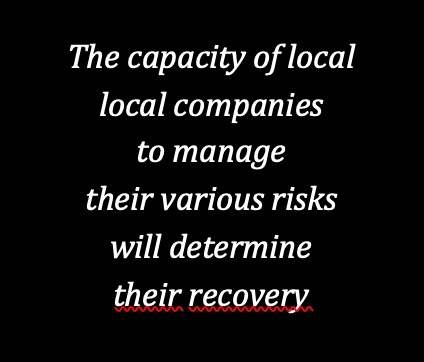
Businesses Need to be Resilient Before the Coronavirus Crisis
The role of companies in addressing these issues represents a paradox for their recovery: it is both a challenge, and an opportunity. It is likely that economic growth will not be as expected but growing in strategy and being prepared for the future ensures the generation of value over time.
COVID-19 has infected all areas of our lives. For companies it has been no different: some have -temporarily- suspended operations, not knowing if they will be able to recover, and others are rethinking processes and operations to continue providing basic products and services.
What puts the continuity of a company at risk? The answer must be considered from the perspective of sustainability with a focus on resilience.
 We can highlight three processes of resilience in the company: the development of the business despite the risk; the maintenance of operations despite the new conditions; and the recovery after the crisis.
We can highlight three processes of resilience in the company: the development of the business despite the risk; the maintenance of operations despite the new conditions; and the recovery after the crisis.
For a company to develop in an uncertain environment such as the one generated by an external, circumstantial, and negative factor such as the crisis, the first step is to identify the risks to which it is exposed in the short, medium, and long term.
Companies may face risks from the environment, their operations, and decision-making. This must be a process under constant construction.
This analysis should include the probability of occurrence, its impact on the business and the controls to mitigate the impact, as well as residual risk management
The ability of companies to effectively identify and manage these risks, make early decisions, and adjust their operations and processes in the short-term will make a difference in how they continue to develop despite the uncertainty.
With the unexpected conditions brought about by this “new normal”, companies have had to ensure their operational continuity.
Now, more than ever, we know that companies are the driving force of economic development, generators of employment, and important actors for the welfare of society, but to survive in this new scenario it is essential to review the policies, procedures and protocols are flexible enough to adapt to change. This is not only a challenge, but also a responsibility.
Crises are always the best incentive to adopt changes.
The role of companies in addressing these issues represents a paradox for their recovery: it is both a challenge and an opportunity. Beyond the state of alarm caused by the crisis, supply chain disruptions, travel limitations, liquidity problems, delayed deadlines, temporary closure of operations, among many other obstacles, companies must consider these considerations for the development and adjustment of their strategy: make the digital leap, rethink, and transform the business model and implement new operating models.
Today, some companies have managed to offer products and services through telework and have adopted new technologies and ways of collaborating. The results are starting to show.
It is likely that the economic growth will not be as expected but growing in strategy and being prepared for the future ensures the generation of value over time.
A company that has undergone all these processes is resilient: when it has well identified all its risks and knows how to manage them; when it can implement in the short term the necessary changes to remain operational; when it is capable of maintaining itself despite changing conditions, innovating, continuing to develop and gradually recovering and adapting to the new environment; and when it does so taking into account its value chain and including social responsibility initiatives. This is how the company’s strategy becomes resilient, and therefore the company can remain in time, being a sustainable company.
ANYARLENE BERGÉS
VP GOVERNMENT RELATIONS, COMMUNICATIONS & SUSTAINABILITY OF INICIA
She holds a Law Degree (LL.B.) from PUCMM and a Master’s Degree in Commercial Law from La Sorbonne University in Paris, France. She holds, among others, studies in Labor Law, Human Development, Strategic Programming with a focus on Transparency, Accountability, and Stakeholder Management.
Source: www.revistamercado.com.do




